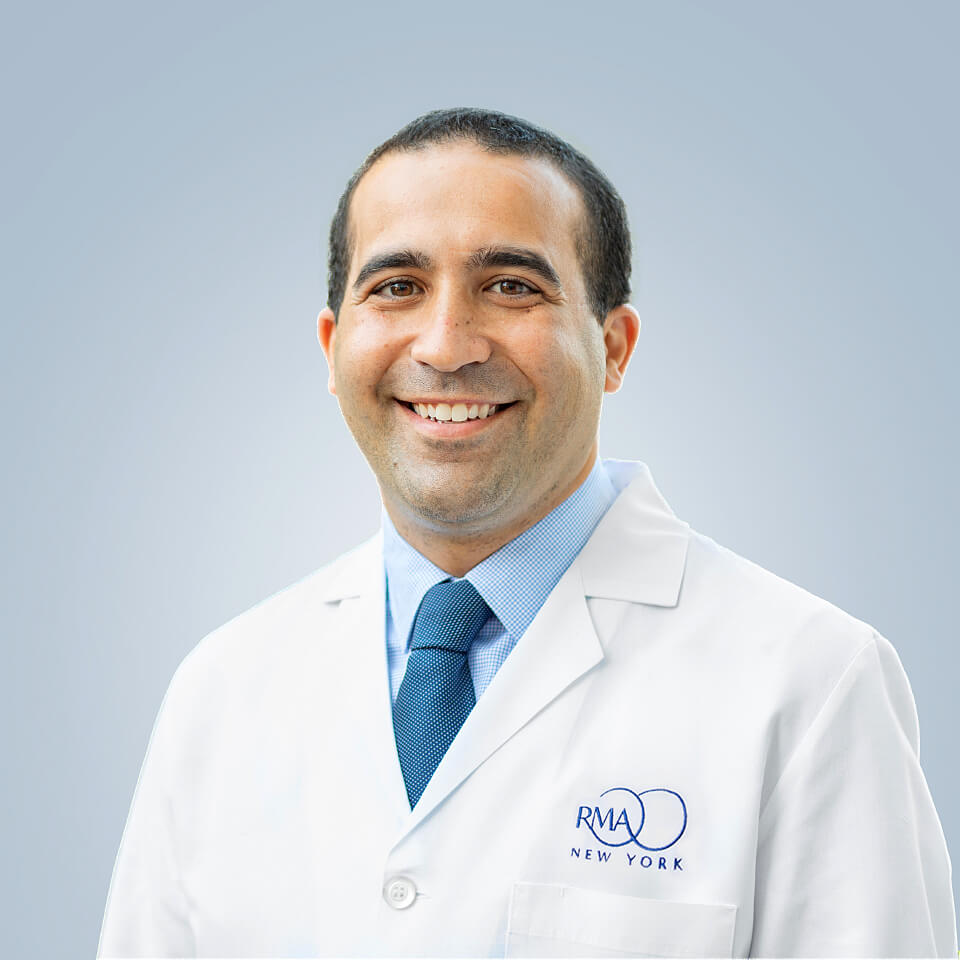Genetic Testing Services
Genetic Counseling
RMA of New York has genetic counselors on staff to assist you in understanding family history, genetic predispositions, and complex genetic information.
Carrier Screening
Carrier screening is a type of genetic testing used to assess genetic risks to a patient/couple’s offspring that would not be evident from personal or family history alone.
Embryo Testing (PGT)
For patients/couples undergoing treatment with IVF, RMA of New York offers Preimplantation Genetic Testing (PGT) to increase the chance of a healthy pregnancy.

Carrier Screening
Carrier screening is a type of genetic testing used to assess genetic risks to a patient/couple’s offspring that would not be evident from personal or family history alone. Genes are the instructions within our cells that are responsible for making our bodies work properly, and humans have two copies of every gene – one inherited from each biological parent. If a gene is no longer working properly due to harmful changes within that gene, a genetic condition may result. The genetic conditions we look for through carrier screening are called recessive disorders, where both copies of the gene (one inherited from each parent) are no longer working properly in order for an individual to actually show symptoms of that condition. Some examples of common recessive genetic conditions include:
- Cystic Fibrosis
- Tay Sachs
- Sickle Cell Anemia
Carrier screening also typically looks for common X-linked conditions, which are conditions that only females (individuals with two X chromosomes) carry. It is completely normal to be a carrier; most people carry one or more recessive conditions and are asymptomatic. However, if a carrier has a child with someone who also carries the same condition, then there is a significant risk (25%) of having a child with that genetic disease.
If both members of a couple are found to be carriers of the same disease, or a female carrier for an X-linked disease, it is possible through in vitro fertilization (IVF) to screen embryos via Preimplantation Genetic Testing (PGT) and determine before pregnancy is attempted whether or not each embryo is predicted to be affected with the genetic disorder. Only embryos that are not affected with the condition are transferred into the uterus to attempt pregnancy. If a couple chooses not to undergo IVF with PGT, knowing that there is an increased risk of having a child with a genetic condition ahead of time can be helpful in other ways, such as being aware that additional prenatal testing is indicated or preparing an appropriate pediatric care team to be available after the baby is born.

Preimplantation Genetic Testing (PGT)
For patients/couples undergoing treatment with IVF, RMA of New York offers Preimplantation Genetic Testing (PGT) to increase the chance of a healthy pregnancy. PGT is a procedure in which embryos created during an IVF cycle are tested for genetic abnormalities prior to being transferred to the patient’s uterus.
PGT fits within the IVF process as follows:
-
During an IVF cycle, embryos are created by retrieving the eggs from the female patient’s ovaries and fertilizing them with sperm in the IVF laboratory. The embryos are cultured in the laboratory and allowed to develop for 5-7 days until they reach the blastocyst stage of development.
-
Using a laser, the embryologist takes a small biopsy sample of cells from the trophectoderm, which is the outer layer of the blastocyst that will later develop into the placenta and other supporting structures of the pregnancy.
-
After the embryos have been biopsied, they are frozen and safely stored at one of our four IVF laboratory locations. Meanwhile, the biopsied samples are sent to an outside laboratory that specializes in PGT.
-
It can take approximately 1-2 weeks for the PGT laboratory to analyze the samples and report the results. Some PGT tests require more time to complete.
-
After the results are provided, your doctor and/or a genetic counselor will review the results with you to help choose which embryo to use for transfer and a frozen embryo transfer cycle can then be scheduled.
RMA of New York offers three types of PGT:
PGT-Aneuploidy (PGT-A)
Preimplantation Genetic Testing for Aneuploidy (PGT-A), formerly known as Preimplantation Genetic Screening (PGS), is used to screen embryos for chromosomal abnormalities.
Found in the nucleus of every animal and plant cell, chromosomes are threadlike structures of tightly wound DNA. Humans are born with 23 pairs of chromosomes; we receive 23 chromosomes (1 in each pair) from the egg cell and 23 chromosomes (1 in each pair) from the sperm cell for a total of 46 individual chromosomes.
Chromosomes play a crucial role in the replication and distribution of DNA during meiosis, the process of creating egg and sperm cells. However, during this process errors sometimes occur at random, resulting in egg or sperm cells with extra or missing chromosomes. This phenomenon is known as aneuploidy. Aneuploidy can occur randomly in the egg or sperm cells of an individual at any age, but does occur more frequently in egg cells as a woman increases in age.
The human body requires exactly 46 chromosomes in 23 pairs, and having any extra or missing chromosomes is usually not compatible with healthy human development. If pregnancy is attempted with an aneuploid embryo, the typical result is implantation failure, pregnancy loss, or a pregnancy with chromosome abnormalities (the most common of which is Down Syndrome). Whether an embryo has the correct number of chromosomes (otherwise known as “euploid”) is not outwardly visible when observing the embryos in the IVF laboratory. However, PGT-A can be used in order to identify euploid embryos, thereby increasing the likelihood of a successful transfer and reducing the chance of pregnancy loss. The doctors of RMA of New York have extensive experience using the results of PGT-A to help many patients achieve their dreams of having a family, while experiencing fewer obstacles on their journey.
PGT-Monogenic Conditions (PGT-M)
Monogenic disorders are genetic disorders caused by pathogenic variants (or changes) in a single specific gene. Preimplantation Genetic Testing for Monogenic Conditions (PGT-M), formerly known as Preimplantation Genetic Diagnosis (PGD) is utilized in situations where there is already a known risk of a specific genetic disorder in the family. This knowledge can come from a known family or personal medical history, preconception/prenatal carrier screening, and/or previous genetic testing. The goal of PGT-M is to identify embryos that are free of the inherited condition for transfer.
Preparing for PGT-M typically requires several months before a PGT lab is ready to analyze samples. This is because PGT-M involves the creation of a custom test for the family (sometimes referred to as a “probe”) that is tailored to the specific genetic variant(s) involved and other identifying genetic markers. PGT-A can be completed concurrently with PGT-M if desired by the patient or advised by a doctor. Performing PGT-M prior to embryo transfer can greatly reduce the risk of having a child with a specific genetic disorder.
PGT-Structural Rearrangements (PGT-SR)
Preimplantation Genetic Testing for Structural Rearrangements (PGT-SR) is available for individuals who are carriers of a balanced translocation or inversion. In these instances, carriers have the correct number of chromosomes, but the chromosome material is rearranged. Although most carriers are healthy, they are prone to creating embryos with extra or missing chromosome material, which increases the risk of failed implantation, pregnancy loss, or the birth of a child with chromosome abnormalities. PGT-SR is used to identify embryos with the correct amount of chromosome material for transfer, in order to greatly improve the chances of a successful IVF cycle and pregnancy. PGT-SR is highly case-specific in terms of whether any specialized preparation with a PGT lab ahead of time will be necessary, which is typically determined after consultation with a genetic counselor and the PGT laboratory.
Limitations of PGT
As with any form of medical screening, there are limitations patients will need to note when considering the option of PGT. Although test accuracy is high (about 97-99%, depending on the type of PGT), it is not 100%. False positives and false negatives can occur.
Furthermore, there are some rare types of chromosome abnormalities that may not be detectable by PGT-A or PGT-SR. In addition, PGT-M can only detect the specific condition(s) being targeted. As such, your doctor may suggest prenatal genetic testing as a follow-up. Further discussion of prenatal testing options with a prenatal genetic counselor and/or obstetrician is recommended. In addition, PGT is unable to screen for disorders that are without an identifiable genetic cause (e.g. spontaneous birth defects, most cases of cerebral palsy, or autism, etc.) for which all pregnancies are at risk, regardless of how they are conceived.

Genetic Counseling
RMA of New York has genetic counselors on staff to assist you in understanding family history, genetic predispositions, and complex genetic information, such as PGT testing and your PGT results. Genetic counseling is available for all RMA of New York patients to help you understand your options, including whether to proceed with genetic testing or to determine which reproductive options are right for you.

Why RMA of New York
RMA of New York serves as the Division of Reproductive Endocrinology and Infertility at Mount Sinai Medical System. Our laboratory team is dedicated to scientific discovery, graduate medical education through RMA of New York’s REI Fellowship Program, and individualized care that focuses on you.
Our team of embryologists are consistently recognized as innovators in reproductive science and medicine, and security and safety standards. RMA of New York has been at the forefront of embryo freezing technology and cutting-edge research, helping countless individuals and partners achieve the dream of building a family.
Featured Resources
![What is Preimplantation Genetic Testing for Aneuploidy (PGT-A) and how is it useful?]() Blog
BlogWhat is Preimplantation Genetic Testing for Aneuploidy (PGT-A) and how is it useful?
For patients considering the option of in vitro fertilization (IVF), it’s likely that your …
Read More![Mosaic Embryos: What does it mean, and how to handle it?]() Blog
BlogMosaic Embryos: What does it mean, and how to handle it?
If you are undergoing fertility treatment using in vitro fertilization (IVF), it is highly likely …
Read More
Get Started
It’s never too early to learn about your fertility and reproductive options.
Have questions?
We can help.
Patient-centric reproductive medicine is our specialty, and we look forward to answering any questions you may have.





























